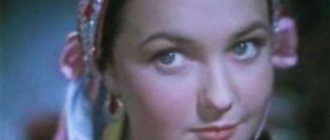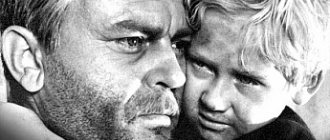Reviews of the book “Metamorphosis” by Franz Kafka
Kafkaesque claustrophobia and the sad consequences of self-denial
I can’t, I don’t know how to read Kafka’s works in one gulp, in one breath, I don’t know how this is even possible. And “Transformation” was no exception. After just a few pages, I had a desire to take a break, to be distracted, to open the window, to walk... - a desire to get out of the cramped, claustrophobic Kafkaesque world, so similar to a cage with mechanical humanoid creatures locked in it. The lines of “Metamorphosis,” written in a dry, unemotional, cobwebby language, entangle, squeeze, squeeze the heart, soul, consciousness, body. From the bourgeois callousness of the characters, from the hopeless to the absurdity of the coldness in their relationships, from the absurd sacrifice of the main character, by the third page one becomes uneasy. A prolonged immersion in such an airless space in which everyone is alienated from everyone else is unbearable. This literary diamond, which has become a “classic” of modernism, can be viewed from different points of view. Do you want a Freudian and psychoanalytic approach? Please you. After reading “The Metamorphosis,” only a lazy mind would not begin to discuss how Kafka’s painful relationship with his father influenced the formation of such a depressing worldview of the writer. You can immerse this work in a historical context and say that in it (as in all of his work) Kafka prophesies - consciously, or not consciously - about the coming era of totalitarianism, the atmosphere of which will be so similar to this crazy Kafkaesque world ; the real story will seem to be copied from the pages of fiction created by Kafka. There is a lot to speculate about if you look at “The Metamorphosis” from the point of view of alchemy and Jewish culture, namely, Kabbalistic teachings. Prague is Kafka’s hometown and also the “mecca” of all magicians and alchemists of the Middle Ages. Here they conducted their experiments on converting base metals into gold. The transformation of Gregor Samsa becomes the key event of the story. Although Kafka’s family were not Orthodox Jews at all, but modern representatives of the bourgeoisie, the flair of Judaism was still present in their lives to one degree or another: for example, in the form of rare trips to the synagogue, reading sacred texts, communicating with friends from the Prague Jewish ghettos. Kafka, which was quite consistent with his character, was interested in the mystical teachings of Judaism. In a mystical, Kabbalistic vein, one can also consider this story, the main event of which - transformation - happens in a dream. The state of sleep has a special meaning in Kabbalah. In addition to everything that has already been said, I was interested in something else. Gregor Samsa, a poor, weak man, who, as they say, was crushed by harsh reality. He is helpless, insignificant, but at the same time, he is absurdly kind and selfless in his care for his neighbors. Moreover, he is selfless to the point of completely leveling his own self. Even having turned into an insect, he continues to worry and think not about himself, not about his fate, but about his family, which calmly sits on his neck. He is more concerned about how his relatives, having lost the financial resource that he is for them, will be able to organize their life - he still does not notice his problems. Moreover, he even feels guilty for causing such inconvenience to his family. He remains indifferent to himself, even, to put it mildly, after such an impressive metamorphosis. To hell with his family, who took what happened so coldly, but he himself doesn’t even wonder what happened to him and why it happened to him. He was used to living without thinking about himself at all. It would seem very noble, quite Christian. But absolute self-denial of one’s Self, of realizing oneself as a separate person, led to the fact that the hero ceased to be a man altogether - Gregor Samsa turned into an insect. His Self was absorbed in constant thoughts and worries about others. If at first I could at least somehow understand Gregor with his selfless self-denial, then after the scene with the open window - if you please. How self-deprecating he treats himself! Greta, while cleaning Gregor's room, opened the window. Opened the window! Here is the way out, here is the salvation from this cramped bourgeois world. But Gregor doesn’t even think about running away, or rather, flying away: he’s a beetle, after all, which means he has wings, and he could flutter his wings - and hello, world! If he had thought a little more about himself, perhaps he would have learned that he has wings... But the insect Gregor, instead of finally breaking free, humbly hides under the bed, under which, by the way, he barely squeezed where he is uncomfortable. For what? So as not to frighten or embarrass my sister with my disgusting appearance. But in my opinion, it’s not his outer shell that is disgusting, but his hyper-derogatory attitude towards himself - that’s what really makes him disgusted. It seems to me that in “The Metamorphosis” Kafka transforms the Christian idea of self-denial, sacrifice in the vein of the modernist paradigm, one of the ideas of which is Nietzsche’s “God is dead.” Now the basis of a person’s existence becomes his Self. And therefore, someone who is deprived of self-awareness, who is incapable of self-reflection, is no longer a person. He is not a person who does not recognize himself as such, does not perceive himself as an individual principle. In the story, Kafka accurately conveyed this through metaphor: he moved Gregor Samsa, choking in self-abasement and denying himself, from a human shell into the carcass of an insect, where he belongs.
(Translation) Kafka's "Metamorphosis": 100 thoughts for 100 years
62. In December 1917, he separated from Felicia for the second and this time for the last time. She survived this and a year later she married another man.
63. Illness and loneliness can break a writer, but Kafka did not write for ordinary reasons: not to please himself, not as a way to make a living, not to impress women.
64. Why did he write? In his famous “Letter to his Father,” squeezed out of himself during a so-called vacation in the mountain village of Schelezen in November 1919, and never sent, he devotes all his work to the man thanks to whom he was born: “My writing was about you; in it I simply moaned about what I could not moan about on your chest.”
65. Hermann Kafka, a former military man and dry goods merchant, was the son of a butcher. Hermann and his wife Julia conceived 5 more children after the birth of Franz in 1883, but two were born in infancy, leaving Franz the only boy among three sisters. Hermann did not do anything obviously wrong to anyone, but literary history contains his image as an oppressor in the life of Franz.
66. As Alan Bennett, author of The Kafka Member, noted: “Herman Kafka constantly received such unflattering reviews that it is very difficult to resist secret sympathy for him, as for all parents of creative people. They never make it."
67. At the same time, Kureishi praised the "hero" Hermann as "perhaps one of [Kafka's] best creations or inventions."
68. The "Letter" is a bewildering list of complaints concerning the many different "spheres of influence" in which Franz felt Hermann was pressuring him, and his own attempts to resist his father.
69. And yet the Letter is replete with hints of hidden, contradictory approval. Franz admits that he felt like a “pathetic semblance” next to his father - “not only in your eyes, but also in the eyes of the whole world, since you were for me the measure of all things.”
70. However, the counter tension leads to the following attack: “You have gotten it into your head to live on my neck. And here we have a parasite that not only bites, but also sucks blood to maintain its life. This is what a true soldier is; it's what you are. You are not fit for life...”
71. With an accusation of parasitic behavior and a wince-inducing reference to a “parasite,” we return to the world of “The Metamorphosis.”
72. In the story, Gregor gradually accepts his insect condition as irreversible, and tries to adapt, since he has always tried to do good for his family, and, in those times when he succumbs to self-pity, is ashamed of himself.
73. How do the Samsa family adapt to Gregor? Filmmaker David Cronenberg, in his introduction to Susan Bernowski's 2012 translation, puts it eloquently: "It doesn't even occur to them that, for example, a giant beetle ate Gregor; they have no imagination." On the contrary, in a rather bourgeois manner, they perceive Gregor’s predicament as “an unfortunate family incident that must be grudgingly dealt with.”
74. The great and terrible moment comes when Gregor's sister furiously asserts that the "monster" in Gregor's room cannot in any way be Gregor, that his very destructive presence in the Samsa house is proof of his inhumanity. Gregor remains human enough to hear and feel these words, and his response to them gives the story its climax.
75. Some of the prominent writers on Kafka's work agreed that Gregor was a suffering saint and his family a collection of monsters.
76. “Gregor,” Nabokov told his students passionately, “is a man in the form of an insect; his family are insects in the guise of people.”
77. In his essay on Kafka, Walter Benjamin Fr.
78. In his Marxist analysis of the work, Notes on Kafka, Theodor Adorno writes with feeling that in Kafka's work so often “the parasitic moment is displaced. Gregor Samsa, not his father, becomes a beetle."
79. However, Adorno does not mention the extent to which Kafka, by displacing a sense of parasitism in literature, reflected himself, the “pathetic likeness” he saw in the mirror.
80. The date of the never sent “Letter to Father” also deserves attention - it was written shortly after another novel that ended in nothing, this time with a dressmaker from Prague named Julia Vokhrytsek. Kafka proposed to her in the summer of 1919. Herman considered his choice rash, ill-considered, and below his status. It is not surprising that the wedding did not take place, under the pretext that the couple could not find housing.
81. But the reason that Kafka gives to Hermann is that he is “internally incapable of marriage,” since marriage is “your [Herman’s] territory.” In other words, Kafka felt that Hermann had already irreparably deformed him in the sexual-romantic field.
82. There were two other major novels in Kafka's life: one was predominantly epistolary, with the talented translator Milena Jesenská-Pollak, who was unhappily married (and therefore unavailable, unless both she and Kafka were willing to change that).
83. Then there was Dora Diamant, who was 19 years old when she met Kafka in the coastal resort of Müritz in 1923. Within weeks they were already planning for the future, contemplating starting over from scratch in Berlin or Tel Aviv. In fact, the modest Dora became Kafka's companion on the path to death.
84. Philip Roth, who taught Kafka's work at the University of Pennsylvania (and also published The Breast in imitation of The Metamorphosis) once wrote a half-essay/half-fiction called "I've Always Wanted to Admire My Abstinence from Food, or, Looking at Kafka,” in which he imagined that Kafka survived tuberculosis and moved to Newark to work as a teacher at a Jewish school (where he teaches the young “Philip Roth”). And this is just Root's fantasy, but it doesn't even come close to how Kafka perceived himself.
85. In a letter dated July 1922, Kafka wrote to Brod that he was somewhat afraid of death, since he had never lived, but that it had both its advantages and disadvantages: “What I have been playing with will happen in reality. I didn't pay myself off with my writing. I've been dying all my life and now I'm really going to die. My life has been more pleasant than other people’s lives, and my death will be more terrible.”
86. Kafka "played" with death to such an extent that his great works can be regarded as a kind of extremely creative rehearsals of the end: small suicides, so to speak. "The Metamorphosis" is the most striking example of them all - the heaviest, most terrifying and unforgettable.
87. By mid-1924, his health had deteriorated so much that he had to move back to live with his parents. He suffered from excruciating tuberculous lesions, and pain when swallowing prevented him from eating. At noon on June 3, 1924, he died. He was 40.
88. Scottish poet-translator Edwin Muir and his wife Willa gave English readers the Kafka they had known and loved for many years. "Transition" was first published in English, translated by Eugene Jolas, in parts, in three issues of the magazine "transition" from 1936 to 1938.
89. However, the first one-volume book in English was published in 1937, translated by A.L. Lloyd, singer, folk musicologist, arranger and writer.
90. Later, through new translations, English-speaking readers came to know a new side of Kafka. By all accounts, the Muirs' translation was too fancy, distorting what Stanley Korngold called "the brilliant simplicity of Kafka's prose."
91. Great books often become dramas when translated, even if the literary masterpiece is already perfect. Steven Berkoff, in his play Metamorphosis, allowed a number of outstanding actors to transform their bodies into the mutated guise of Gregor Samsa: first, in 1969, he was played by Berkoff himself, then by Brad Davis (1982), Tim Roth (1986), Roman Polanski (1988) and, on Broadway in 1989, Mikhail Baryshnikov.
92. One wonders how David Cronenberg would adapt The Metamorphosis into film, with The Fly giving us an idea of the possibility. The protagonist of this film does not wake up as an insect, but mutates into an insect-human hybrid over the course of several weeks, during which - just as Nabokov says of Gregor - "his human feelings are mixed with the new instincts of the insect."
93. Kafka wrote a significant number of stories from the point of view of various animals: "The Study of a Dog", "Report to the Academy", "The Singer Josephine, or the Mouse People", "Nora". It was as if he were saying: “You are in the body you are in, it creates the problems that it creates, but your soul still cries.”
94. Mathieu Roth wrote a children's book, My First Kafka, in 2013, which retells The Metamorphosis, with illustrations by Rohan Daniel Jason. It's a good idea that could lead to a whole field of similar books.
95. But Kafka's original work may also be of interest to young readers. Last summer, during a pool party with my relatives, I had a copy of Kafka with me, and at some point my daughter's nine-year-old friend picked up the book and started asking questions about it. The next time I reached for the book, it was gone.
96. Will there ever be another Kafka? If he were alive today, in the age of instant publishing, mountains of rejected books, and 24-hour (self-)advertising, would he be able to enter the game of writing?
97. One would hope, but this business is not suitable for those who are too modest, and clearly not ideal for those who have reviewed everything they have done in their lives and decided that most of it should be burned.
98. On the other hand, it is quite difficult to imagine Kafka on Twitter, although he certainly had a gift for aphorisms. “In the struggle between you and the world, be the world’s second” - there are exactly 50 characters here.
99. Social media would be a good fit for Kafka. His secrecy and mystery could make him, contrary to expectations, extremely popular.
100. Can we imagine that in 2015, the outstanding inventor of our time could be lonely, not to say “undateable”, tied to his parents’ house, trapped in an unattractive office job, typing into the night his works that he cannot finish to the end and at the same time cannot quit? This is somehow unlikely or, rather, even undesirable. But this is, more or less, Kafka's story, and this is why we can enjoy the most famous, greatest short work in the history of literature.
Original article
Translation on the site for which I did it
Hardcore: Benedict Cumberbatch reads Metamorphosis





